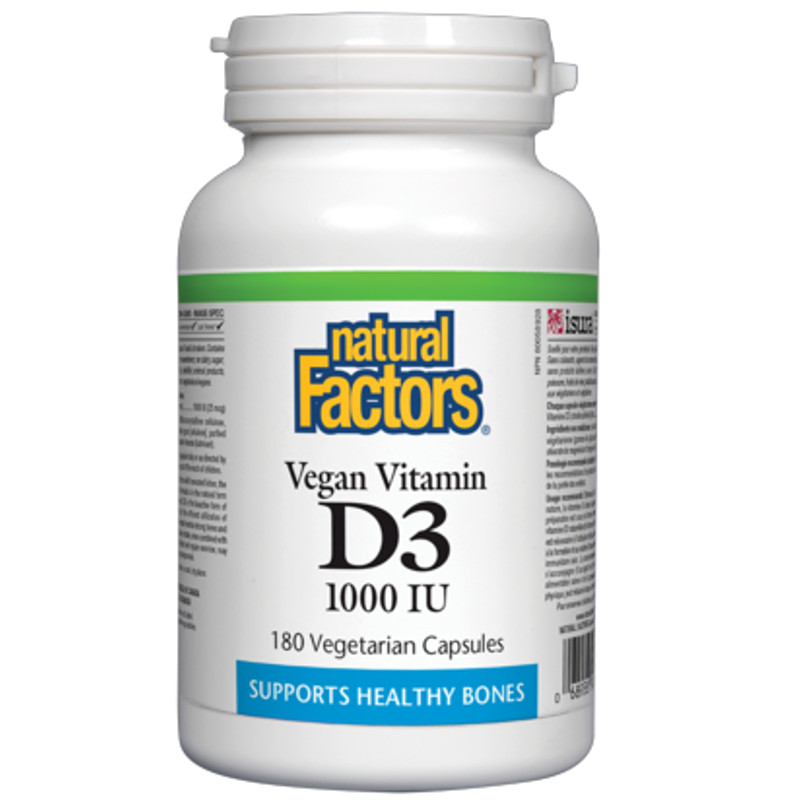
Vitamin D deficiency can lead to rickets and osteoporosis because of its important role in bone formation, but did you know that a vitamin D deficiency may also increase your risk of cardiovascular disease and lower your immune function?
Vitamin D is often referred to as the “sunshine” vitamin because our body manufactures vitamin D from our skin’s exposure to the ultraviolet B (UVB) rays of the sun.
Canadians typically experience a decrease of their vitamin D levels during the winter months due to lack of sun exposure.
Because vitamin D is hard to obtain naturally from dietary sources, many Canadians opt to supplement through the winter months. Natural food sources include cod liver oil, fatty fish, and egg yolks. However, many processed foods such as breakfast cereals or pasteurized orange juice and milk are fortified with synthetic vitamin D.
Learn more about how much vitamin D you need each day on our blog “Health Canada Increases Non-Prescription Limit for Vitamin D”.
Below are some important roles that vitamin D plays in our health:
BONE STRENGTH
Vitamin D helps regulate calcium in the body to maintain calcium levels in our blood and in our bones and teeth. Interestingly, if we have adequate calcium intake but low vitamin D, we can have poor calcification of bones. However, in the opposite scenario of adequate vitamin D and low calcium intake, bone calcification improves.*
Because of vitamin D’s role in bone development, it’s especially important for growing children and also menopausal women who are at higher risk of developing osteoporosis.
HEART HEALTH
New data suggests that vitamin D deficiency is linked to a higher risk of heart disease. Several underlying symptoms of heart disease, such as high blood pressure and inflammation, have been attributed to low vitamin D levels.**
While it’s not clear whether simply supplementing with vitamin D will subsequently reverse the risk of heart disease, it’s certainly a topic of interest for researchers. Consequently, vitamin D’s role in heart health should not be overlooked.
IMMUNITY SUPPORT
Vitamin D supports the immune system by lowering inflammation and helping to produce antimicrobial proteins, which destroy invading germs and viruses. This combination of reduced inflammation and increased antimicrobial defenses can help your immune system fight infections better.
For example, in a 2009 study only 10.8% of children who supplemented with vitamin D contracted the flu compared to 18.6% of children who did not.***
As a final note, every individual has a unique set of dietary, health, and lifestyle circumstances so it’s best to speak with a health care professional to determine whether it’s appropriate for you to supplement with vitamin D or not.
REFERENCES:
* Hass, Elson. (2006). Staying Healthy with Nutrition. Berkley, CA: Celestial Arts
** https://www.ncbi.nlm.nih.gov/pubmed/27117316
*** https://www.ncbi.nlm.nih.gov/pubmed/20219962
Shop this page
 |
 |
 |
DISCLAIMER
Nothing contained on this website should be construed, nor is intended to be used for medical diagnosis or treatment. It should not be used in place of the advice of your physician or other qualified healthcare provider. Should you have any healthcare related questions, please call or see your physician or other qualified healthcare provider promptly.
Always consult with your physician or other qualified healthcare provider before embarking on a new treatment, diet, or fitness program. If you have any specific questions about these matters you should consult your doctor or other healthcare provider. If you think you may be pregnant you should speak to a doctor or other healthcare provider, and if you think you may be suffering from any other medical condition you should seek immediate medical attention.

